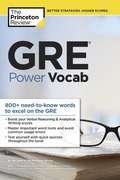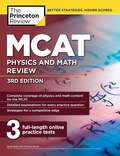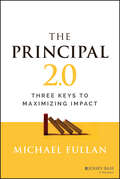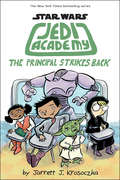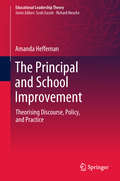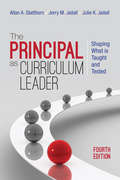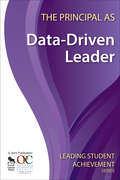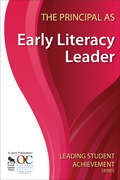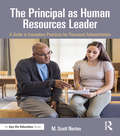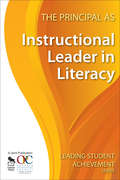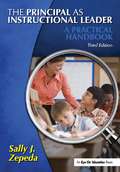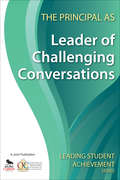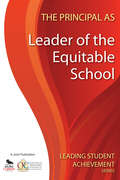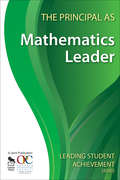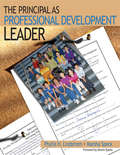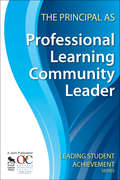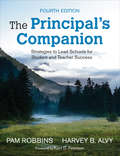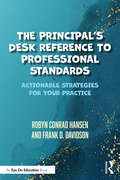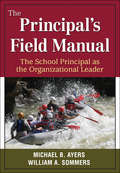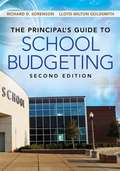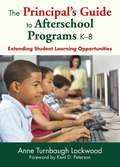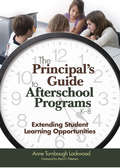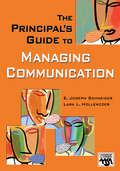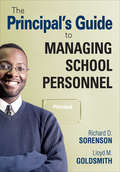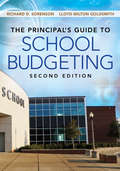- Table View
- List View
The Princeton Review: GRE Power Vocab
by The Staff of The Princeton Review Anne CurtisThis book is filled with useful definitions and study tips for over 800 words, along with skills for decoding unfamiliar ones and strategies that help to liven up flashcards and boost memorization techniques.
The Princeton Review® MCAT® Physics and Math Review (Graduate School Test Preparation)
by Princeton StaffInside this book, you'll find proven strategies for tackling and overcoming challenging questions, along with all the practice you need to help get the score you want. Everything You Need to Know to Help Achieve a High Score. * In-depth coverage of the challenging physics & math topics on this important test * Sample MCAT questions with step-by-step walk-through explanations * Bulleted chapter summaries for quick review * Full-color illustrations, diagrams, and tables * Extensive glossary for handy reference Practice Your Way to Excellence. * Access to 3 full-length practice tests online to help you gauge your progress * End-of-chapter drills and explanations * MCAT-style practice passages and questions * Test-taking strategies geared toward physics and math mastery Gain Mastery of These and Other Topics! * Kinematics * Mechanics * Fluids and Elasticity of Solids * Electrostatics * Electricity and Magnetism * Oscillations and Waves * Sound * Light and Geometrical Optics
The Principal 2.0: Three Keys to Maximizing Impact
by Michael FullanBreak out of the traditional, narrow role of principal and transform your school for the better In 2014 Michael Fullan set his sights on the daily needs of school leaders in his bestselling book The Principal. This updated edition shows how the principal’s role continues to change—alongside our changing world—and how we can embrace the transformation in short order. As crucial in-school influencers of student learning, principals have an opportunity and an obligation to maximize student achievement. But how? In The Principal 2.0, Fullan explains why the answer lies neither in micro-managing instruction nor in autonomous entrepreneurialism. He shows a new way forward that allows principals to expand their roles without overstepping and contribute to the development of the whole school. Even in difficult times of crisis, there’s room for principals to take action. In The Principal 2.0, Fullan explains how to loosen focus on accountability and instead concentrate on capacity-building; focus less on technology and more on pedagogy; abandon fragmented strategies; and forgo individualistic solutions in favor of collaborative effort. Discover the three key roles that administrators must play in order to have the biggest impact Foster the professional capital of teachers and get more accomplished for all students Find "action items" to help implement this proven program effectively Adopt strategies that have been successfully field-tested in schools across the United States and CanadaDiscover why The Principal is a bestseller in educational leadership, and strike out into the future with this new edition, updated for the changing role of today’s principals.
The Principal Strikes Back (Star Wars: Jedi Academy #6)
by Jarrett J. KrosoczkaAs told through a mix of comics, doodles, and journal entries, it's Victor Starspeeder's third year at Jedi Academy! It's also his first year EVER without his sister, Christina. Plus, things at Jedi Academy are... weird. After last year's security breach, Principal Marr has been demoted and replaced with Commander ZC-04, a big, scary droid. There's a curfew, new regulations, and everyone is on edge. But when Victor and his friends dig a little deeper into the changes at the school, they find that there's a lot more to this story than the droids want to admit! It's an all-new, out-of-this-world Jedi Academy adventure as The Principal Strikes Back!
The Principal and School Improvement: Theorising Discourse, Policy, and Practice (Educational Leadership Theory)
by Amanda HeffernanThis book investigates the localised effects of reform by exploring the impact of a school improvement policy agenda on the work of three experienced principals. It presents three longitudinal case studies within a shared specific leadership context in Queensland, Australia. The case studies enable an exploration of the way the principalship in this context has evolved over time, providing deep insights into the practices and beliefs of three experienced school leaders working in a period of rapid and urgent systemic reform. The nature of global reform policy borrowing means that the research and the findings within this monograph are relevant for international audiences.The book describes a new way to understand and theorise the effects of reform policies and associated pressures on school leaders. Using post-structural theory, it provides a better understanding of the specific effects of reform policy ensembles, particularly when combined with an analysis of the ways policy and discourse work together at a wider level to create an environment that disciplines the principalship. Further, it sheds lights on the means of complying with or contesting policy influences and how the work of leaders has changed over time.
The Principal as Curriculum Leader: Shaping What Is Taught and Tested
by Allan A. Glatthorn Jerry M. Jailall Dr Julie K. JailallYour best resource for curriculum leadership post-NCLB and beyond! Put quality curriculum front and center with this classic toolkit to savvy curriculum leadership for the 21st Century. Newly revised and updated case studies, research, and state and national curriculum and leadership standards complement a completely new section focused on emerging technologies. New features include: Major chapter revisions with research on ESSA, CCSS and more Up-to-date information on Professional Standards for Educational Leaders Concrete examples of district-level curriculum mapping, planning, and integration New information on professional growth, state curriculum frameworks, online assessments, SBAC, PARCC, and adaptive testing
The Principal as Data-Driven Leader
by Ontario Principals' CouncilThis concise guide helps principals introduce a data-driven school improvement planning cycle, create a team to gather relevant data, and embed data practices into a school's culture.
The Principal as Early Literacy Leader
by Ontario Principals' CouncilThis resource presents an overview of how three-, four-, and five-year-olds learn to read and shows school leaders how to implement and support quality early literacy programs.
The Principal as Human Resources Leader: A Guide to Exemplary Practices for Personnel Administration
by M. Scott NortonIncreasingly, personnel administrative duties within schools have been delegated to the local school principal. This accessible book arms school leaders with the knowledge and skills required to be an effective human resources leader and shows them how to fold these additional duties seamlessly into their daily routines. This practical resource provides school administrators with guidance on personnel selection, growth and development, orientation and placement, school climate, legal processes, leadership for classified staff and other important human resources processes. Special Features: • Grounded in extensive research and interviews with practicing principals• Provides a wealth of examples, strategies, tips, and best practices for leading the human resources function at the school level• Chapter exercises and case studies explore the skills and knowledge needed for effective human resource leadership• Details the significance of developing a positive school climate• Legal aspects of human resources administration are made digestible and understandable
The Principal as Instructional Leader in Literacy
by Ontario Principals' CouncilBased on a balanced literacy approach, this practical guide supports principals and school leaders in improving literacy instruction and increasing achievement for K–12 students.
The Principal as Instructional Leader: A Practical Handbook
by Sally J. ZepedaIn the updated third edition of this highly successful book, leadership expert, Sally Zepeda offers savvy advice to both new and seasoned principals and assistant principals. You get practical tools and strategies, along with real-world examples to help you improve teacher effectiveness and boost student achievement. This edition features valuable resources for teacher evaluation and professional development programs, including: Tools and procedures for conducting classroom observations and pre- and post-observation conferences How-to steps for assessing the culture and climate of your school Strategies to address marginal teaching Techniques to support adult learning and professional development Related News & Media Dr. Doug Green featured a book summary of The Principal as Instructional Leader: A Practical Handbook (3rd Edition) on his website.The Principal as Instructional Leader: A Practical Handbook (3rd Edition) by Sally J. Zepeda was reviewed in The 21st Century Principal.
The Principal as Leader of Challenging Conversations
by Ontario Principals' CouncilSteer high-stakes conversations with staff and students toward win-win outcomes with this handy pocket guide to effective communication. Includes scripts, case studies, and checklists.
The Principal as Leader of the Equitable School
by Ontario Principals' CouncilEquitable schools equal high achievement for all students! This invaluable book provides an expanding awareness of equity issues to not only principals and district leaders, but also school equity committees. From the novice to the experienced school leader, readers will discover how to create a learning community that erases achievement gaps and welcomes students of all backgrounds. This new volume in the Leading Achievement Series provides action steps for: Establishing a climate that promotes equity Empowering and supervising staff to accelerate change Garnering support and involvement from students and the community Assessing progress toward equity and sustaining growth
The Principal as Mathematics Leader
by Ontario Principals' CouncilThis guide provides research, tools, and support for leading effective mathematics teaching and learning, observing and evaluating mathematics instruction, and promoting faculty growth.
The Principal as Professional Development Leader
by Dr Marsha Speck Dr Phyllis H. LindstromThe authors provide principals with the tools needed to help teachers and staff enhance their skills and improve student learning.
The Principal as Professional Learning Community Leader
by Ontario Principals' CouncilThis resource provides principals with practical support, step-by-step plans, and hands-on strategies to lead the development of thriving professional learning communities in their schools.
The Principal's Companion: Strategies to Lead Schools for Student and Teacher Success
by Pamela M. Robbins Professor Harvey B. AlvyThe classic personal guide for principals, updated to address today’s challenges Of all the elements needed for a successful school, a competent, responsive and visionary principal may be the most important. And for over a decade, principals of all experience levels have turned to The Principal’s Companion for ideas, techniques and reflective opportunities that help them do their jobs better. The thoroughly updated fourth edition covers big-picture strategies and day-to-day tactics such as: The principal’s many roles Critical skills for effective leadership Honoring the school’s mission Working together to build a learning community Starting effectively and staying the course
The Principal's Desk Reference to Professional Standards: Actionable Strategies for Your Practice
by Robyn Conrad Hansen Frank D. DavidsonWith the ever-changing, complex role of the principalship, school leaders are thirsty for a useful desk reference that aligns with professional standards. This actionable book brings the PSEL standards to life, providing leaders with support, mentorship, and practical advice. This book provides solutions to challenges and answers the hard questions associated with educational leadership alongside a host of tools, strategies, organizers, templates, and rubrics. Including voices from experienced leaders across rural, urban, suburban, tribal, and international settings, this book helps principals at all levels navigate challenges and make decisions that positively impact their students’ futures. You will be inspired to strive for a better future for your school community as you continually develop skills leading to a long, successful career in educational leadership.
The Principal's Field Manual: The School Principal as the Organizational Leader
by William A. Sommers Michael B. AyersThis user-friendly handbook focuses on five facets essential to successful organizations—mission, strategy, organizational structure, people, and leadership—to help principals become proactive, effective school leaders.
The Principal's Guide To School Budgeting
by Richard D. Sorenson Lloyd Milton GoldsmithLearn how to create a winning school budget during challenging economic times. Effective administrative practices, both fiscal and academic, are continually being redefined at all levels. Developing budgets that keep up with economic changes and instructional expectations is a challenge. This best-seller puts leaders through the budgeting process, with vision and planning as firm guides to resource allocation. Emphasizing tough budgetary climates, the book includes a budget model that shows how to align organizational goals with a sound fiscal accountability system.
The Principal's Guide to Afterschool Programs K8: Extending Student Learning Opportunities
by Anne TurnbaughBuild a strong afterschool program that increases learning while incorporating standards!Research shows that participation in structured afterschool programs holds huge benefits for children's academic and social development. But how can school principals create programs that help maximize student proficiency? This book holds the answers.Based on an AASA/Mott Foundation study, this concise yet comprehensive guidebook offers a step-by-step process to help principals and administrators build a successful and sustainable afterschool program. The author discusses how to integrate standards and incorporate a high-level curriculum and provides profiles of programs that have improved achievement, particularly for students who are at risk. School leaders will find checklists, planning worksheets, evaluation tools, and surveys, plus guidelines for: Developing a parent and community base of support Hiring staff and obtaining volunteers Getting funding and grants Collecting and evaluating program dataThis book will help school leaders identify the most effective ways to structure afterschool programs. The author shows how to avoid common problems and demonstrates through examples that, by working closely with staff and the community, it's possible to raise student proficiency levels and cultivate academic success.
The Principal's Guide to Afterschool Programs, K-8: Extending Student Learning Opportunities
by Dr Anne Turnbaugh LockwoodProvides a step-by-step process for creating a sustainable afterschool program that incorporates a high-level curriculum, integrates standards, and improves achievement, particularly for students who are at risk.
The Principal's Guide to Managing Communication
by E. Joseph Schneider Lara L. HollenczerDevelop a successful communication strategy that reaches all members of the school community so that everything else has a chance to work as planned.
The Principal's Guide to Managing School Personnel
by Richard D. Sorenson Lloyd M. GoldsmithA comprehensive guide to building successful relationships with all school personnel! Ideal for practicing and aspiring principals, this in-depth resource presents policies, procedures, and techniques for managing faculty and support staff and creating effective work environments. The authors provide case studies, strategies, and reflective exercises in each chapter to help administrators evaluate their schools and practices. Based on ISLLC and ELCC standards for school leadership, this book covers: Shaping school culture to promote shared ownership of the school’s vision Recruiting, selecting, and retaining qualified personnel Effective communication and conflict resolution Handling challenging situations such as supervising marginal employees and addressing grievances
The Principal's Guide to School Budgeting
by Richard D. Sorenson Lloyd M. GoldsmithCreate a winning school budget during challenging economic times! This revised bestseller walks school leaders through the budgeting process, focusing on vision and strategic planning as firm guides to resource allocation. With an eye toward tough budgetary climates, the authors provide a budgeting model that helps you align organizational goals with a sound fiscal accountability system. In this new edition you will learn: 25 tips for budgeting during an economic downturn How to develop a school budget using the most effective practices Methods for conducting a needs and program assessment How to prepare and analyze a school action plan Answers to some of the toughest budgeting dilemmas
